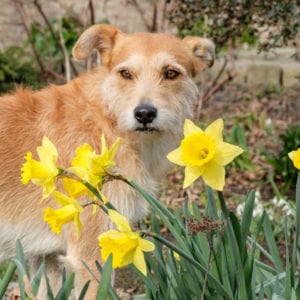Pets, especially puppies, have a tendency to put just about anything in their mouths. For young pups, this is how they explore their world, yet adult dogs can also be curious enough to take a bite. Cats, too, are not exempt from this characteristic and might try to lick anything that smells tasty. Unfortunately, not everything is safe for our pets to eat. Many times, curiosity can lead to an emergency situation that warrants a call to the pet poison control helpline. Yet, there are things you can do to prevent most, if not all, of these dangerous situations! Read our prevention tips below, and call us at (732) 671-3110 if you have any questions.
 Pet Poison Prevention
Pet Poison Prevention
Preventing pet poisoning takes some forethought and planning. The first step is to learn which substances are poisonous, and then make a plan to minimize your pet’s exposure to them.
Here are some common items for springtime that are poisonous to pets:
- Fertilizers – Fertilizers can help make our gardens and lawns beautiful, but some of them can be toxic to your pets. Some organic fertilizers like blood and bone meals can be particularly appetizing to your dog or cat, but they can cause serious issues for your pet. Meanwhile, plant fertilizers contain certain compounds (such as organophosphates) that can be fatal, even if a small amount is ingested. Be careful about using any fertilizer! Follow the directions and make sure your pet has no access to fertilized areas until it is safe.
- Insecticides – Most insecticides cause minor irritation if ingested, yet larger quantities consumed can be problematic. Additionally, some contain organophosphates, which as we discussed above, are toxic!
- Certain flowers and plants – Common spring flowers such as hyacinths, spring crocus, daffodils and true lilies are all potentially toxic to pets if ingested. Most will cause severe gastrointestinal upset, but lilies, for example can be fatal to cats, causing kidney failure. Be sure to keep your pets away from these plants in your garden, or use pet-safe plants!
- Certain foods – Grapes, raisins, nuts, chocolate, avocados, garlic, onions, and many other human foods are toxic to our furry friends. Make sure to never feed your furry friends human food that contains these ingredients! And if your pet snuck a bite of anything you’re unsure about, use petpoisonhelpline.com to determine if it’s poisonous!
- Essential oils – While essential oils are a great, natural way to keep your house smelling lovely, some scents are toxic to our pets. Cats are especially sensitive and can absorb them both orally and through the skin. Citrus scents, peppermint, tea tree, eucalyptus, pine, and pennyroyal oil are just some of the oils that are toxic to cats and dogs alike. Be very cautious in your use of these oils, and don’t allow your pet to come into contact with them, even through a passive diffuser.
- Household cleaners – Many household cleaners contain concentrated chemicals, scents, and oils that are harmful to your pet. When using any household cleaner such as a bleach, wood polish, Febreze, or your Swiffer, be sure to follow the packaging’s directions. Keep your pet out of the area you’re cleaning until the solution has dried.
- Medications – Many human medications are dangerous for pets and could cause serious illness. Be sure to always store your medicine out of paws’ reach. Child-locked containers are not pet-proof enough as dogs and cats can easily chew through the plastic. Store them in a secured cabinet.
The best way to protect your pet from these poisons is to limit their exposure to them! Keep human food on your plate, don’t bring poisonous plants into your home, and follow directions when using fertilizers and insecticides! If ever you are worried that your pet may have eaten something they shouldn’t have, call ASPCA’s pet poison control helpline at (888) 426-4435 or the Pet Poison Helpline at (855) 764-7661.
